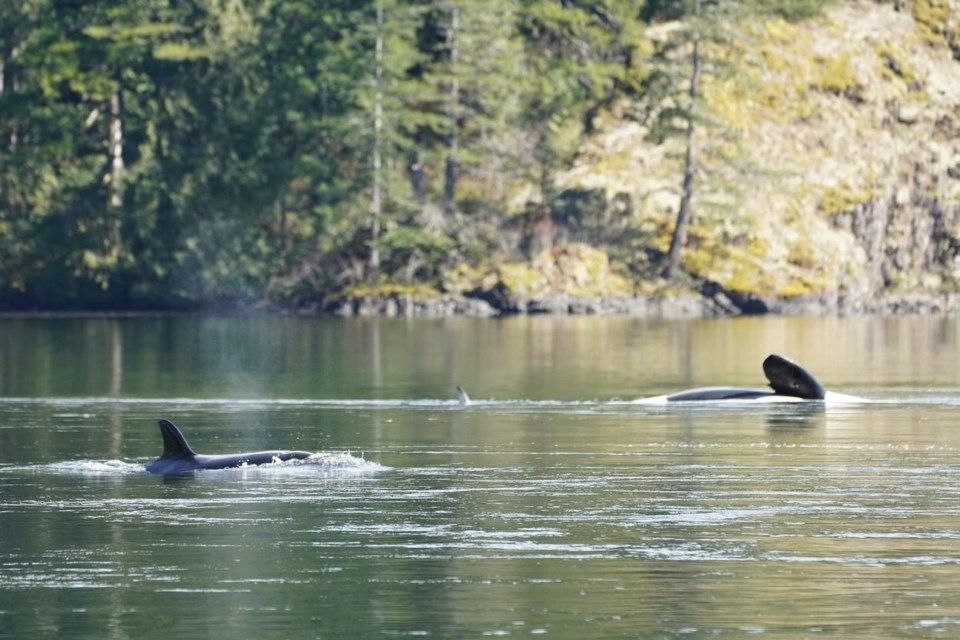ZEBALLOS, B.C. — Efforts to coax an orphaned whale calf out of a lagoon off Vancouver Island have been paused and fisheries officials are now monitoring the animal from afar until the tidal situation improves, Fisheries and Oceans Canada says.
Paul Cottrell, the pacific marine mammal coordinator with the department, said Friday that despite an "amazing" collaborative effort to free the animal on Thursday failed, they're holding out hope it can free itself from the lagoon near the village of Zeballos, B.C.
"Ideally the animal leaves the lagoon on its own," Cottrell said Friday. "It's like it's trapped in there."
He said the calf is "very reluctant" to pass over a sandbar that it's mother got stuck on last weekend before dying in the shallow waters, despite efforts by locals to free the animal.
Officials and local First Nations are now "monitoring and assessing" the calf from afar this weekend, keeping an eye on it's condition using drones.
Cottrell said the orca calf has since been photographed with a bird in its mouth, indicating it's foraging for food on its own, but the timeline to successfully free it is likely short.
"It's lots of work going on and we'll continue at it until hopefully we have a successful outcome," he said. "This lagoon, it's very deep in the middle and that's where the animal seems to be the most comfortable."
Cottrell said a flotilla of 11 boats on Thursday nearly got the animal to leave, but it wouldn't go over a sandbar, and now they await more favourable tides in the coming days.
The two-year-old calf's mother died in the lagoon last weekend while local residents tried to free the beached animal, and a necropsy of the 15-year-old Bigg's killer whale showed she was pregnant with a female fetus when she died.
The long days since the orca calf became orphaned and trapped have been challenging both physically and emotionally, Cottrell said, and chances for success lessen as time goes by.
"We have tried various techniques and they haven't worked to date, so that was challenging but we're we're not giving up," he said. "The timeline is likely short for us to be successful."
In a statement issued Friday, the Ehattesaht First Nation said collaborative rescue efforts on Thursday came close to freeing the calf, but the animal is "not ready to leave."
"We did get her closer but right close that flight or fight instinct took over and she swam back underneath us and went all the way to back end of the lagoon," the statement said. "Everyone was pretty let down."
The lagoon, the statement said, is subject to quickly changing tides that won't improve for a few days.
"It changes direction quickly and right now even at high tide it's too shallow for the little one," the statement said. "She doesn’t know we are trying to help. And we have noticed that she might be eating sea birds that are landing there. That is a really hopeful sign."
The First Nation's statement also said the whale's death and efforts to free the orphaned calf have put a spotlight on the small island community.
"Zeballos is the smallest municipality in B.C. and it’s been a challenging community for many years," the statement said. "We lose power in our community almost every storm and sometimes that lasts for a week."
Industries like forestry, mining and fishing have come and gone, and cellphone service is spotty, the statement said, and education and basic services for the Nation's members are lacking, but "we have a plan to fix it."
"We really have been working at this for the past decade and are really about to make some real progress for our people; for everyone in Zeballos," the statement said.
"Everyone talks a lot about Reconciliation and in some ways this story is helping bring some of that work right to our doorsteps."
This report by The Canadian Press was first published March 29, 2024.
The Canadian Press




